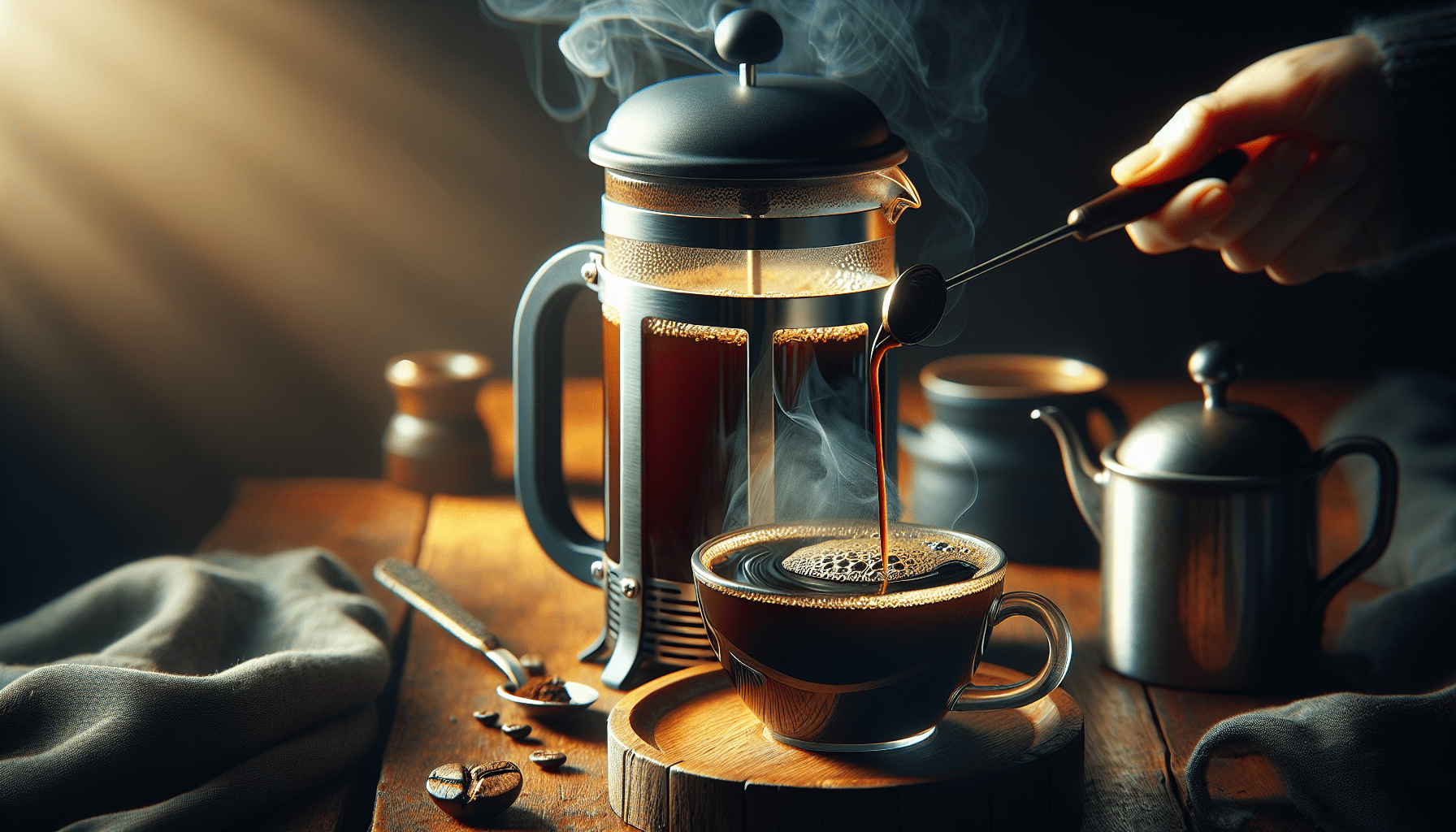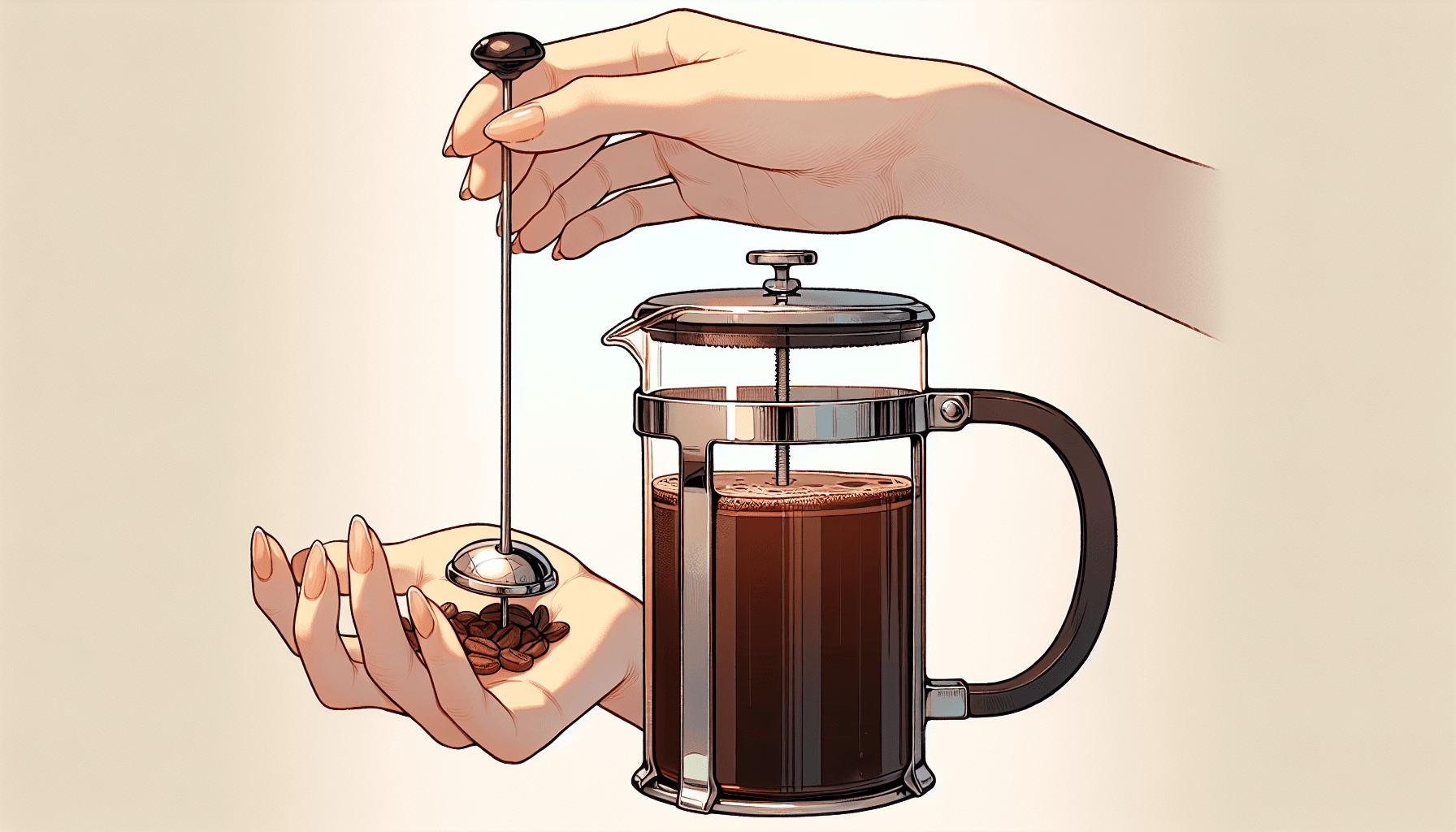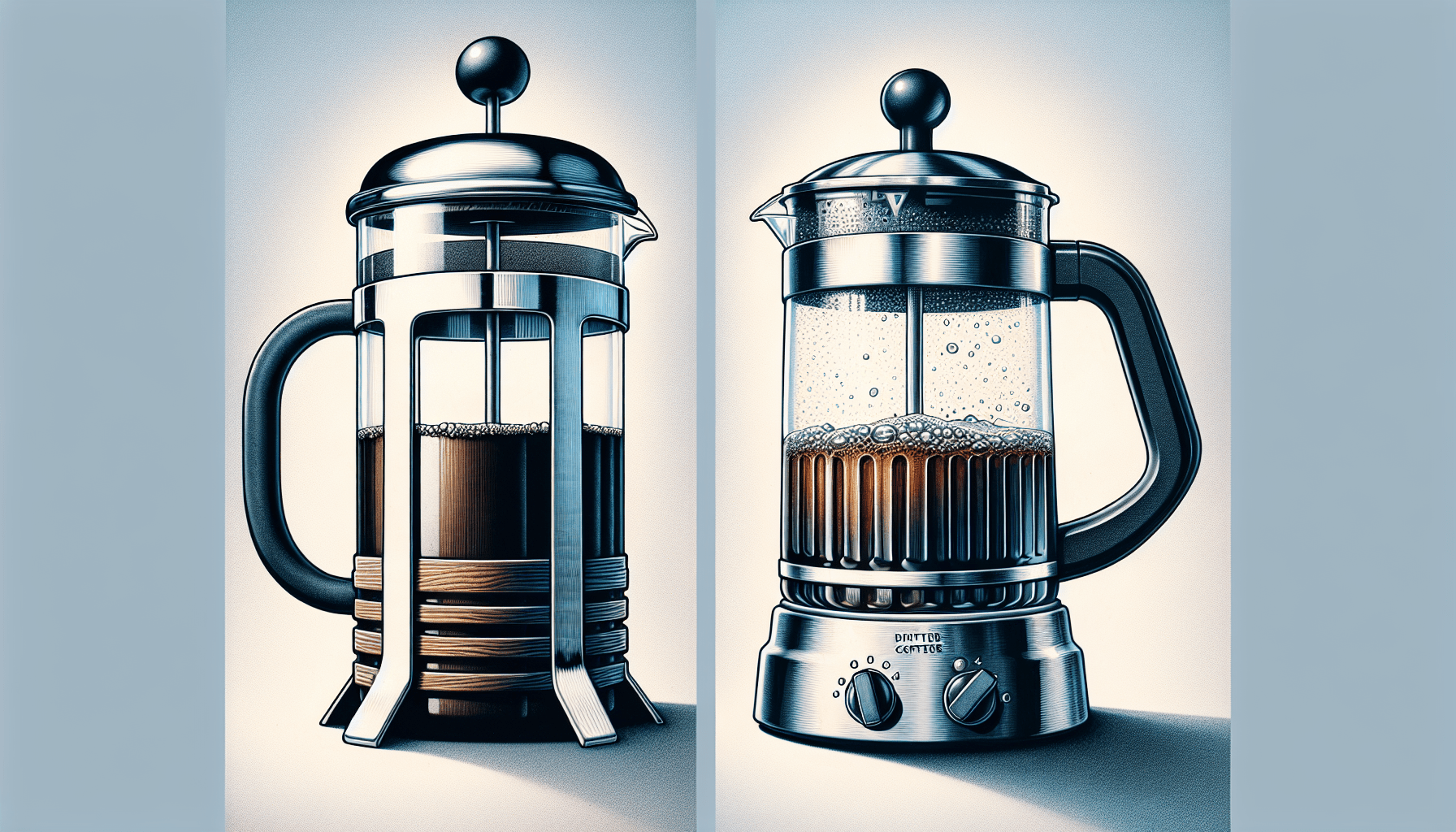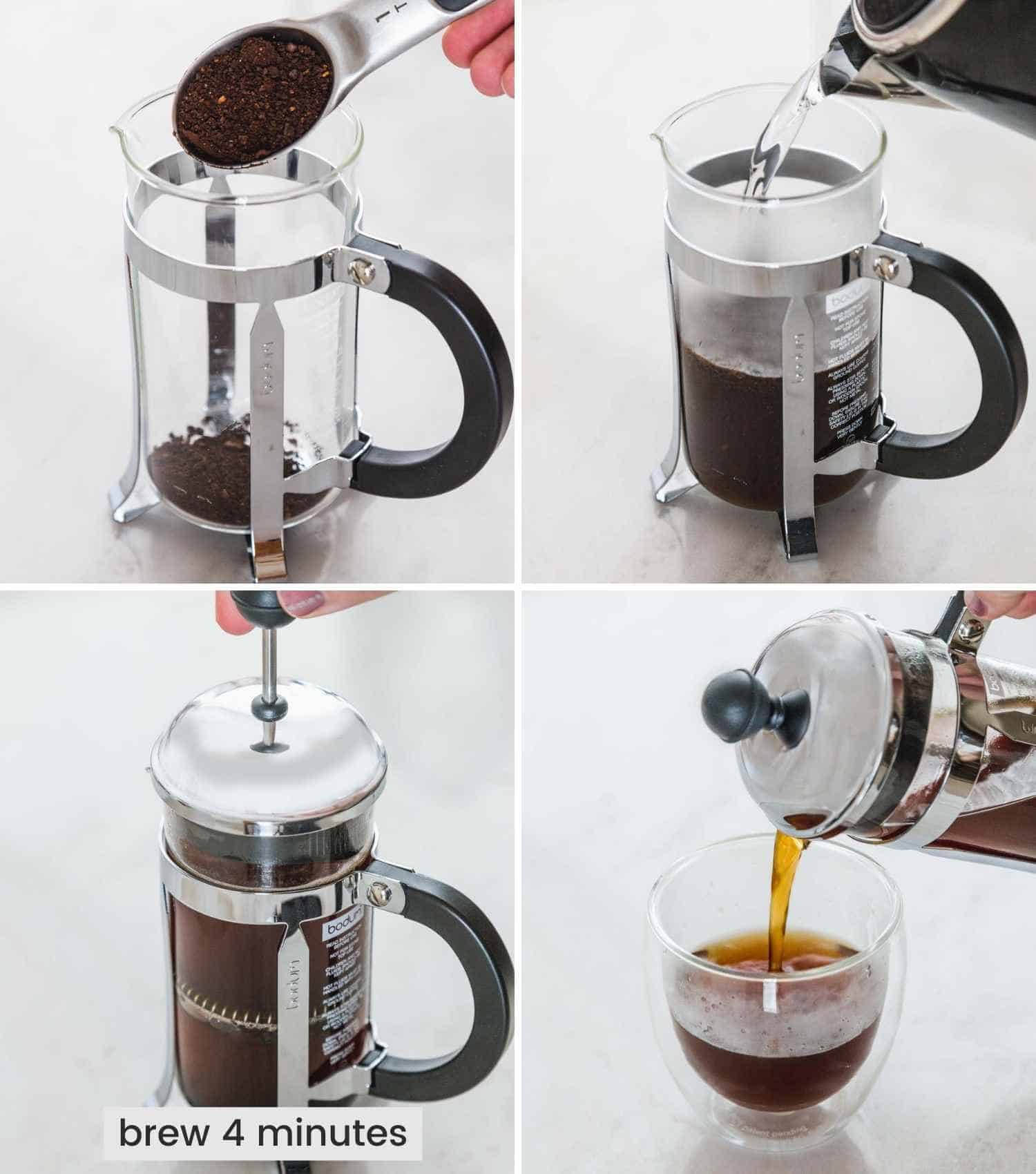Imagine waking up to the delightful aroma of freshly brewed coffee, filling your kitchen and tantalizing your senses. As you eagerly pour yourself a cup, you might find yourself wondering just how many cups of coffee a typical French press can produce. The answer to this pressing question lies within the functionality and design of the French press itself, as well as the preferences of individual coffee lovers. By understanding the capacity and brewing process of this beloved coffee-making method, you’ll be able to enjoy the perfect cup, whether it’s for yourself or for sharing with friends.
Size of French Press
3-Cup French Press
A 3-cup French press, also known as a small French press, is designed to make approximately three cups of coffee. This size is perfect for individuals who prefer to savor their coffee alone or for couples who enjoy a cozy morning ritual together. The 3-cup French press has a compact size, making it easy to store and handle. It is a great option for those living in smaller spaces or for those who travel frequently and want to enjoy an authentic cup of coffee wherever they go.
8-Cup French Press
An 8-cup French press is a medium-sized French press that can yield around eight cups of coffee. This size is ideal for small gatherings or households where multiple people enjoy coffee. It offers the flexibility to cater to different coffee preferences, allowing everyone to have their desired amount. The 8-cup French press provides enough coffee to keep you fueled throughout the day or to share with close friends and family during social gatherings.
12-Cup French Press
A 12-cup French press is the largest size available and can produce approximately twelve cups of coffee. This size is perfect for large families or events where a larger quantity of coffee is needed. Whether you’re hosting a brunch or planning a get-together, the 12-cup French press ensures that there is always enough coffee to go around. It is a convenient choice for those who entertain frequently or offices with many coffee enthusiasts. The 12-cup French press allows you to easily prepare a generous amount of coffee without compromising on taste and quality.
Coffee-to-Water Ratio
Standard Ratio
The standard coffee-to-water ratio for French press brewing is 1:15, which means using 1 part coffee to 15 parts water. This ratio is widely accepted and produces a flavorful and well-balanced cup of coffee. To determine the amount of coffee needed, calculate the volume of water you’ll be using and divide it by 15. For example, if you have a 3-cup French press, which roughly translates to 12 ounces of water, you will need 12/15 ounces of coffee.
Stronger Coffee Ratio
If you prefer a stronger brew, you can adjust the coffee-to-water ratio to your liking. Some coffee enthusiasts prefer a 1:12 or even a 1:10 ratio for a bolder taste. Experiment with different ratios to find your perfect strength. Keep in mind that a stronger ratio may result in a more intense and robust flavor, but it could also lead to a slightly bitter taste if not brewed properly.
Weaker Coffee Ratio
On the other hand, if you prefer a milder cup of coffee, you can use a higher water-to-coffee ratio. This will result in a weaker brew that is less intense in flavor. A 1:18 or 1:20 ratio can be suitable for those who enjoy a lighter and more subtle coffee experience. Adjust the ratio according to your personal taste preferences and make sure to adjust the brewing time accordingly as well.
Actual Yield
Varies Based on Cup Size
The actual yield of a French press varies based on the cup size, as well as the individual coffee-to-water ratio used. While the names of French press sizes imply the number of cups they can produce, it’s important to note that the size of the cup may vary. For example, a 3-cup French press might yield three small cups or two larger mugs, depending on the cup size you consider standard. To determine the actual yield, it’s best to measure the volume of your French press and adjust the ratio accordingly.
Varies Based on Strength Preference
The actual yield of a French press can also be influenced by the strength preference of each individual. If you prefer a more concentrated coffee, you may use a higher coffee-to-water ratio, which might result in a lower overall yield. Conversely, if you prefer a milder brew, you might use a weaker coffee-to-water ratio, resulting in a higher overall yield. It’s important to find the right balance between strength and quantity to ensure a satisfying coffee experience.
Factors Affecting Yield
Coffee Beans
The type and quality of coffee beans used can greatly affect the yield of a French press. Different beans have different densities, and this can impact how much water they absorb during the brewing process. Darker roasted beans tend to absorb more water and swell, resulting in a slightly lower overall yield. Experimenting with various coffee beans can help you understand how different varieties and roasts can affect the final quantity of coffee produced.
Grind Size
The grind size of the coffee beans is another factor that influences the yield in a French press. Finer grounds tend to extract more flavor and oils from the beans, resulting in a more concentrated cup of coffee. However, finer grounds can also clog the filter of the French press, reducing the overall yield. Coarser grounds, on the other hand, allow water to pass through more easily, resulting in a higher yield but a less intense flavor. Finding the right grind size for your preferred yield and taste is essential in optimizing your French press brewing process.
Brewing Time
The length of time you let your coffee steep in the French press can also affect the yield. Allowing the coffee to steep for a longer duration typically results in a stronger brew but might reduce the overall yield. On the contrary, a shorter steeping time may produce a milder cup of coffee with a higher overall yield. Finding the perfect brewing time for your desired taste and quantity requires a bit of experimentation.
Water Temperature
The temperature of the water used in the French press brewing process can impact the overall yield. Hotter water tends to extract more flavor and oils from the coffee grounds, resulting in a stronger cup of coffee. However, excessively hot water can also cause the grounds to release undesirable flavors, affecting the overall taste. It’s essential to find the right balance between water temperature and yield to ensure a satisfying and flavorful cup of coffee.
Measuring a Cup of Coffee
Standard Cup Size
A standard cup of coffee is typically considered to be 6 ounces in the United States. This measurement is the universal standard when it comes to coffee serving sizes. When using a French press to brew coffee, keep in mind that the capacity of the French press may not necessarily match the standard cup size. It’s important to adjust the brewing ratio accordingly to achieve the desired quantity and strength of coffee.
Different Cup Sizes
However, it’s essential to note that cup sizes can vary depending on the country or the manufacturer. In Europe, for instance, a typical cup of coffee is around 4 ounces. If you prefer using European measurements, it’s crucial to factor in the smaller cup size when determining the amount of coffee needed for your French press brewing. Paying attention to cup sizes can help you achieve consistent results and avoid any unexpected variations in taste or strength.
Serving Size Conversion
US vs European Coffee Cup Sizes
As mentioned earlier, there is a difference in coffee cup sizes between the United States and Europe. If you are accustomed to using US measurements, transitioning to European measurements may require some adjustments. Understanding the difference in cup sizes can help you achieve the desired volume of coffee when using a French press. It’s always a good idea to check the specific cup size recommendations or measurements provided by the French press manufacturer or your coffee beans’ packaging.
Customary Coffee Servings
In addition to standard cup sizes, it’s worth noting that customary coffee servings may differ based on cultural preferences and personal habits. Some individuals may prefer a larger cup of coffee to start their day, while others may enjoy smaller, more frequent servings throughout the day. It’s essential to consider your personal preferences when determining the appropriate French press size and brewing ratio for your coffee needs.
Personal Preferences
Individual Consumption Habits
When it comes to French press coffee, personal preferences play a significant role in determining the ideal yield and brewing process. Understanding your own consumption habits will guide you in selecting the appropriate French press size, coffee-to-water ratio, and brewing time. If you are the sole coffee drinker in your household, a smaller French press might be sufficient. However, if you often host coffee-loving guests or have multiple coffee drinkers at home, opting for a larger French press may be more convenient. Consider your lifestyle and consumption patterns to ensure a tailored coffee experience that suits your needs.
Sharing a French Press
Serving Multiple People
If you frequently share your French press coffee with others, it’s important to consider the quantity you’ll need to serve multiple people adequately. For example, a 3-cup French press may not provide enough coffee for more than two people, especially if they prefer generous servings. In such cases, upgrading to an 8-cup or 12-cup French press would be a practical choice. This ensures that each person receives their desired portion of coffee without having to go through multiple batches.
Coffee Strength Preferences
When sharing a French press with others, it’s important to consider their coffee strength preferences as well. Some individuals may enjoy a bold and intense cup of coffee, while others may prefer a milder and more subtle taste. By discussing and accommodating everyone’s preferences, you can adjust the coffee-to-water ratio accordingly. This allows each person to enjoy their preferred coffee strength without compromising on flavor or yield.
Typical Yield Range
General Ranges
The typical yield range of a French press can vary based on several factors, such as the cup size, coffee-to-water ratio, and personal preferences. On average, a 3-cup French press may yield approximately 12-18 fluid ounces of coffee, an 8-cup French press may yield 32-48 fluid ounces, and a 12-cup French press may yield 48-72 fluid ounces. However, it’s important to remember that these ranges are estimates and can be influenced by various brewing variables.
High and Low Estimates
The high and low estimates of the typical yield range depend on factors such as the coffee bean variety, grind size, brewing time, and water temperature. Some individuals may achieve a higher yield within the range by utilizing a weaker coffee-to-water ratio or a shorter brewing time. Conversely, others may strive for a lower yield to obtain a more concentrated and intense flavor. Experimentation and adjusting the brewing variables will help you find the perfect balance and yield that suits your taste preferences.
Final Thoughts
Experiment and Adjust
The French press brewing method offers a unique and versatile coffee experience, allowing you to experiment with different variables to achieve your perfect cup. Don’t be afraid to adjust the coffee-to-water ratio, grind size, brewing time, and water temperature to meet your specific taste preferences. The beauty of the French press lies in its flexibility and adaptability, giving you the freedom to tailor the brewing process according to your own individual preferences. Embrace the endless possibilities and enjoy discovering your perfect brew.
Enjoying Coffee Together
Whether you’re savoring a cup of coffee alone or sharing it with others, the French press creates the perfect opportunity to enjoy this beloved beverage together. The act of preparing and sharing coffee can foster connection and create cherished memories. Whether it’s a quiet morning ritual, a cozy gathering with friends and family, or a moment of respite in a bustling workplace, the French press allows you to indulge in the delightful ritual of brewing coffee and enjoy its rich flavors in the company of those you hold dear. So, brew a fresh pot of coffee, gather around, and savor the joy and warmth of shared moments over a steaming cup of French press coffee.




